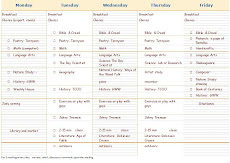 We're heading up towards the end of the first trimester, so I've started thinking about exams. Last year we did a bit of Charlotte Mason type exams, at least in the first term.
We're heading up towards the end of the first trimester, so I've started thinking about exams. Last year we did a bit of Charlotte Mason type exams, at least in the first term.I went searching online back then for resources and examples, but a few new ones have shown up online since then:
The Tyranny of Exams -- not against CM, but against the "competitive exams" so prevalent nowadays. According to this very interesting blog post, CM wrote:
We absolutely must get rid of the competitive examination system if we would not be reduced to the appalling mediocrity which we see, in China, for example, to have befallen an examination-ridden empire.CM believed that exams were supposed to be an opportunity for students to demonstrate what they knew, not be caught out in what they didn't.
Ambleside Online has updated their site quite extensively during this summer and has a Exam Project site with examples of CM exams for different age levels. It also has a list of Big Questions that CM tended to emphasize in her exams.
Simply Charlotte Mason has a blog on exams, too.
From the sample PNEU Exams for middle schoolers you find a lot of examples of quotes given and explanations asked for, such as this:
"The gods have come down to us in the likeness of men." Where and by whom was this said? What ancient story is referred to?You also get lots of:
and in language
Describe
Explain
Give an account of....
What do you know of....?
Sketch...
Tell the story of...
Translate....In some ways, not unlike narration itself, except looking at a bigger picture.
Parse...
Take from unstudied dictation...
Oddly enough, the verbs in the exams are quite similar to those in the public-school standards such as California's. Where I think they differ is that the CM exams referred to particulars and to specific books of literary quality, whereas the CA standards, for example, refer to general knowledge and often to abstract ideas. I think that CM expected students to read excellent works and dig out the meat for themselves, so to speak. Whereas many of the standard-based lesson plans I find online, at least, are like this, or this. There is a well-meant attempt to pull students in with references to their own experience and conventions, but I think CM would have thought this missed the point of a liberal education, designed to foster the ability to look past one's own time and frame of experience. And the modern standards seem to be designed towards teaching the child what to think about the events he reads about.
It SOUNDS nobler in a sense to say "Study the early strengths and lasting contributions of Rome" than to say "Give an account of Horatius at the bridge". But I fear that the student in the first mode will basically be taught to say what the teacher or the textbook says about "strengths" while the student who has read about Horatius and perhaps then read Macaulay's poem will understand the strengths in a much more lasting way.
I had planned to write down study questions for my Year 7 student as we went through the coursework this term, but it did not happen. Sigh.... anyway, I'll probably work on that in the next couple of weeks. Those verbs I isolated are helpful -- now I just have to relate them to objects. I have to admit I am finding the Standards useful in looking at the big picture in what we're doing. I'll try to write more about that some other time.
Exams are kind of humbling for me because they make me realize how much we haven't gotten to that I meant to. For example, Music and Art, and handwork. Nature Study has taken a back seat too. And by no means the amount of writing I had hoped to do, though I think he's gained some ground in mental idea formation by the discussions we've had.



Excellent post! I think the way you contrasted CM exams with modern exams is dead-on.
ReplyDelete